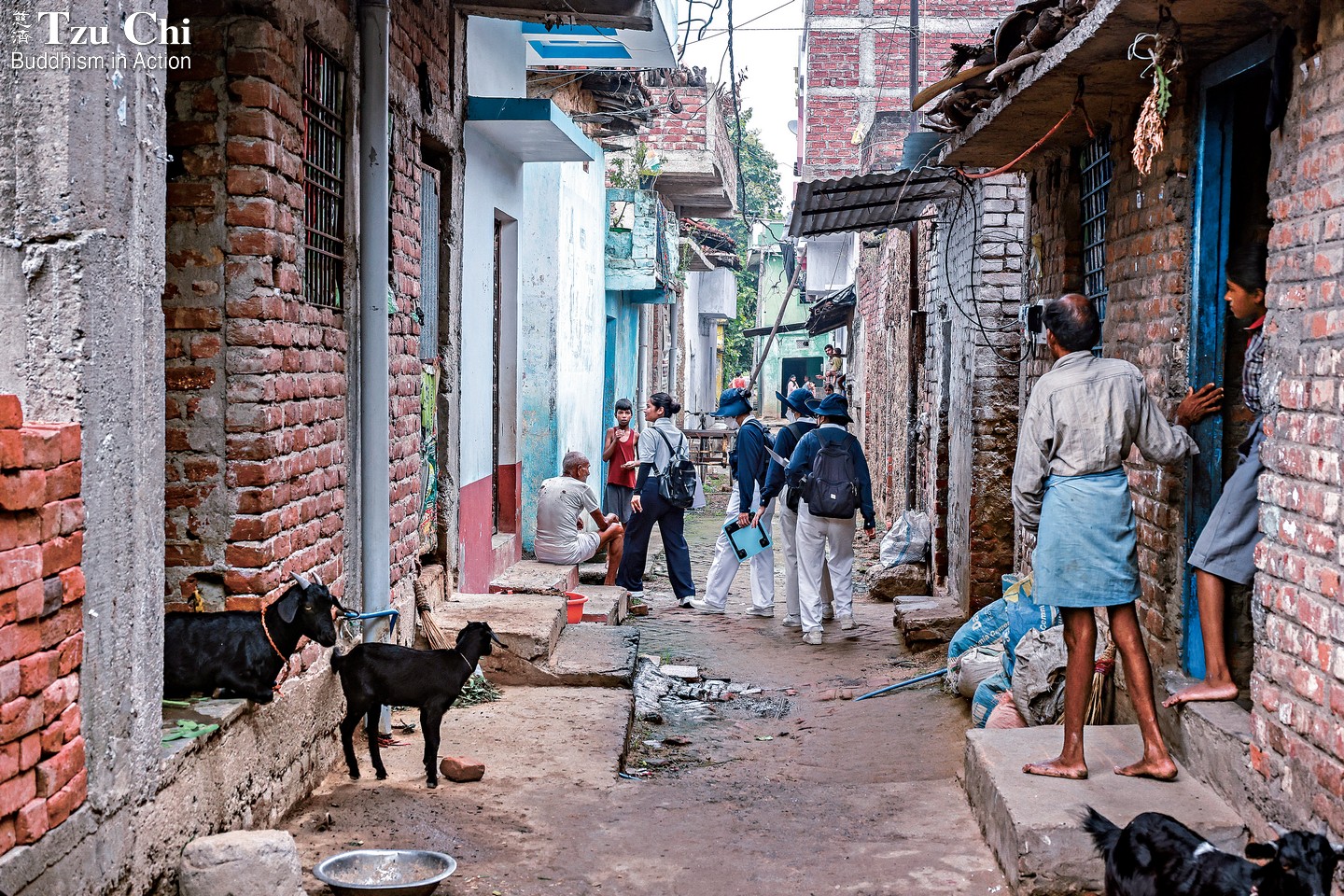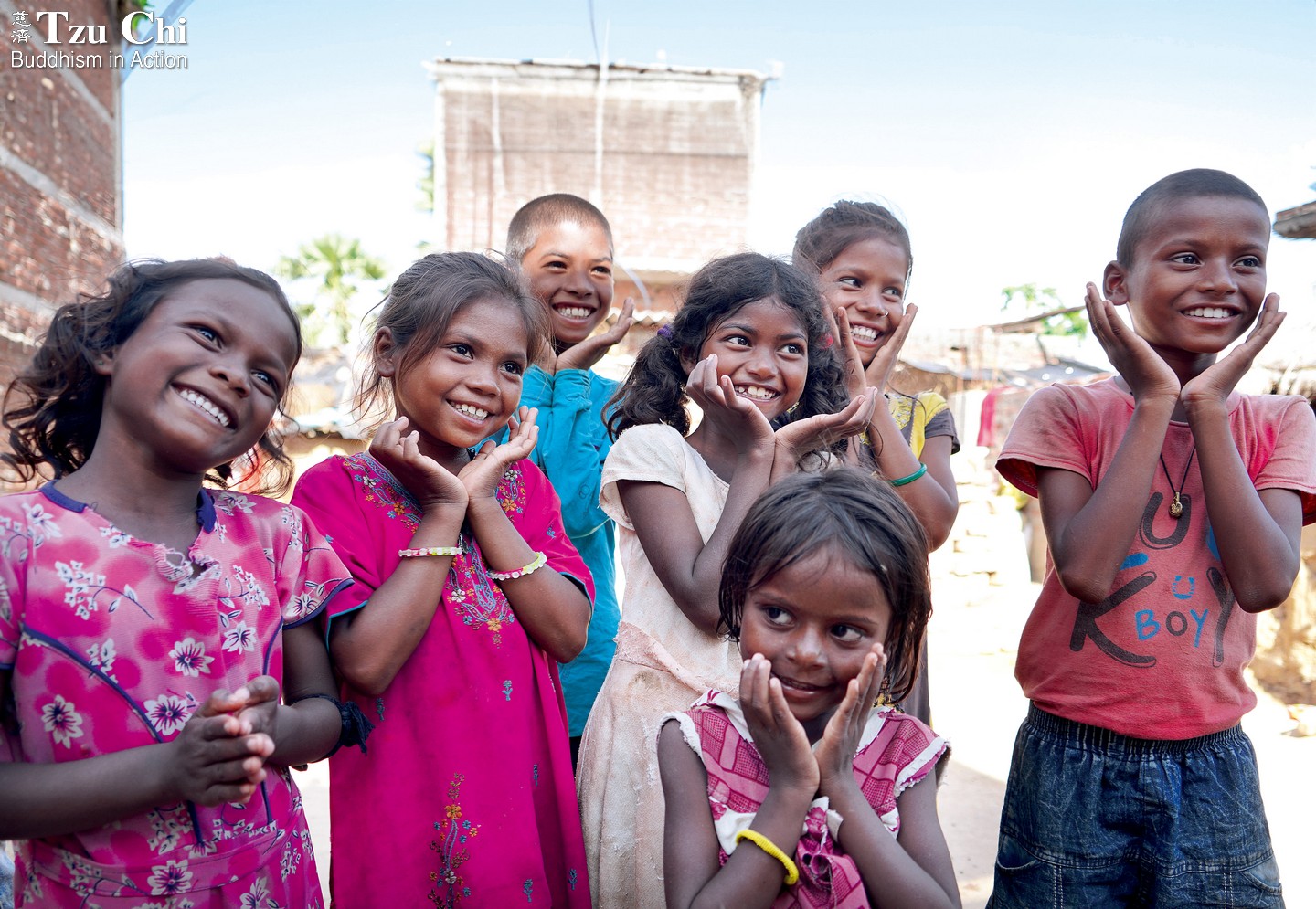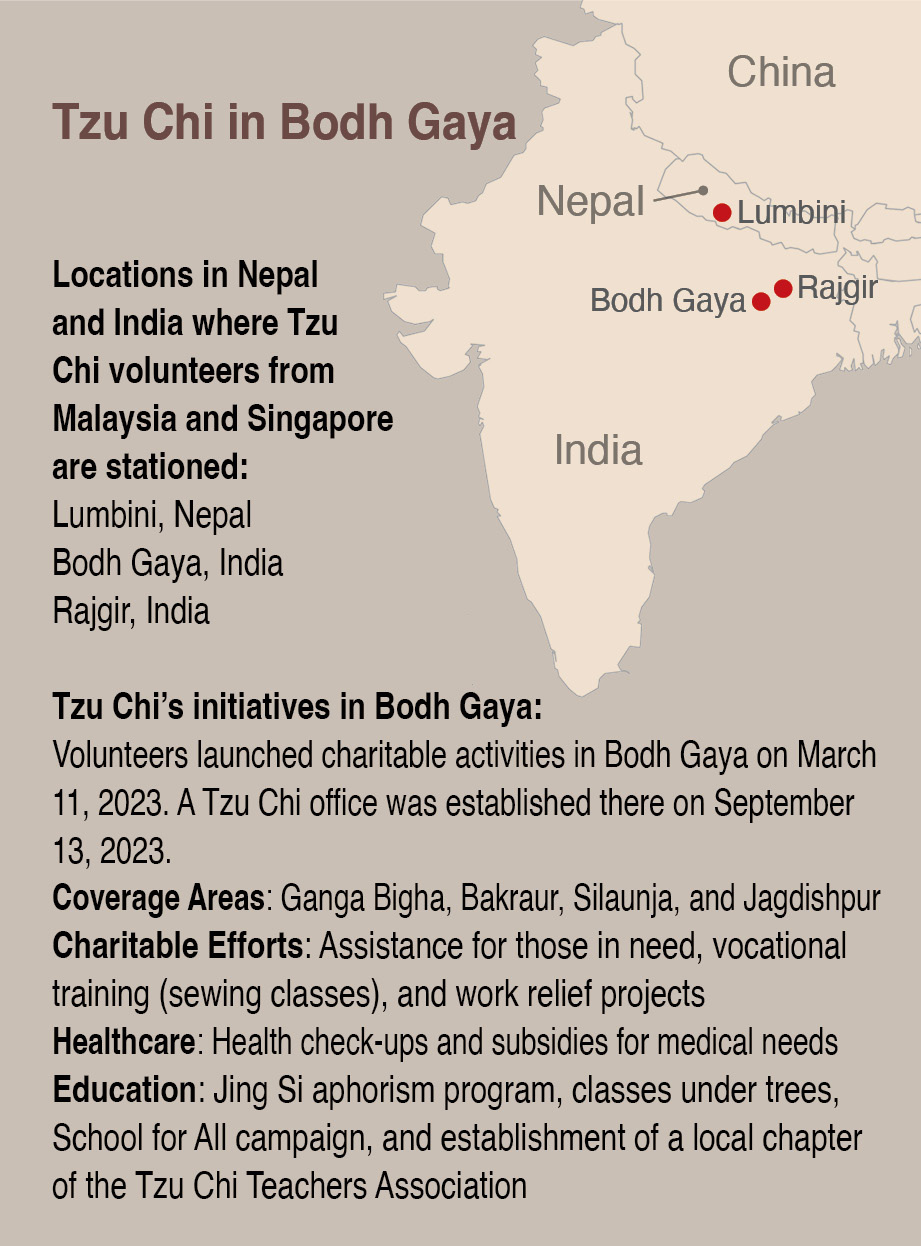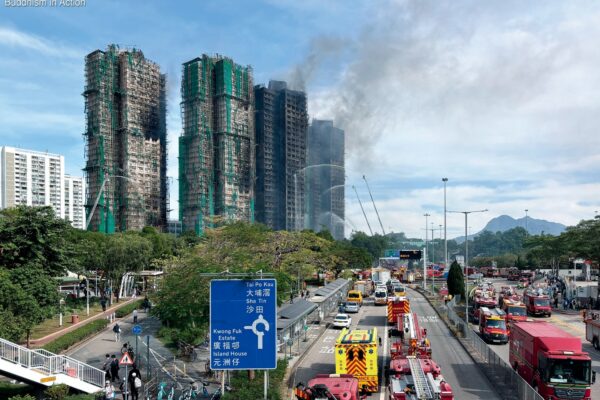By Wei Yu-xian
Translated by Wu Hsiao-ting
The Buddha attained enlightenment more than 2,500 years ago in Bodh Gaya, India, now one of four major Buddhist pilgrimage sites. Since March 2023, Tzu Chi volunteers from Singapore and Malaysia have been actively engaged in charitable endeavors there, contributing to the well-being of local people.

Tzu Chi’s medical volunteers visited the densely populated village of Rattibigha in Bodh Gaya several times in September 2023 to conduct health check-ups for villagers. Teng Pick Cheang
Early on the morning of September 20, 2023, two tuk-tuks—also known as auto rickshaws—were parked outside the Tzu Chi office in Bodh Gaya, India. The roofs of the tuk-tuks were laden with blackboards, electric fans, soccer balls, tableware, and notebooks. Ten Tzu Chi volunteers sat inside the vehicles, ready to embark on a journey to two schools located about 40 to 50 minutes away. Amar Kumar, a native volunteer, was perched on a motor scooter nearby, with fellow volunteer Yaw Ah Moi (姚雅美), a retired vice principal from Malaysia, as his passenger.
Their first destination was Rajkiya Madhya Vidyalaya Ghato School, a school so remote that even the tuk-tuk drivers had to seek directions along the way. In May 2023, a survey conducted by Tzu Chi volunteers on water quality at several schools in Bodh Gaya revealed that this particular school faced a shortage of clean water, a common challenge in rural India. The volunteers also discovered the school lacked essential school supplies. Their findings prompted the foundation to step in to address these issues.
The school had been without access to running water for two decades, relying solely on two buckets of water brought in daily by a female teacher living nearby for the children’s handwashing needs. Tzu Chi volunteers undertook the task of tapping into the government-installed water pipeline nearby, directing water to the school’s water tower, and then installing pipelines to the kitchen, washbasins, and toilets.
Despite these efforts, the school’s access to water was short-lived. Farmers, discovering the pipeline to the school, intercepted it midway and redirected the water for irrigation, leaving the school once again without water. Volunteer Yaw Ah Moi had had several discussions with the school principal, Shiv Pujan, urging him to seek government assistance in addressing the water issue.

Children in Bodh Gaya make the “Happy Face” gesture taught by Tzu Chi volunteers. Ye Jin-hong
Upon arriving at the school this day, the volunteer team visited the first-grade classroom, in which 45 students were seated on the fabric-covered floor, some with even younger children snuggling up to them, likely their siblings. They relied on a single light bulb and two windows for illumination. Like the other classrooms, this one was equipped with just one ceiling fan, despite the high temperatures so prevalent in India. The school also lacked sufficient tableware, leading to a rotating lunch schedule. Even the students’ beloved football games were hindered by damaged soccer balls. The visiting volunteers were bringing much-needed items to address these material deficiencies. Principal Shiv Pujan, with a smile, conveyed gratitude, saying, “Thanks to Tzu Chi, we no longer face a shortage of those items.”
Parents in the community struggled to make ends meet, lacking the money to open bank accounts. As a result, the government couldn’t even transfer funds to them for purchasing uniforms for their children. Students were compelled to attend school in casual attire. The principal told the volunteers he was seeking a solution, and Yaw expressed hope for positive outcomes.
After that first stop, the volunteers then proceeded to Ghongariya School. Though 180 students were enrolled in the school, only 120 or so attended every day. Principal Sarmila Kumari was deeply troubled by the high student absenteeism, attributing it to the limited number of classrooms and parents keeping their children at home to assist with farming or household chores. Yaw offered to accompany teachers to make home visits to absent students during holidays or when teachers weren’t required to be at school, encouraging such students to return to school. When the principal expressed concerns about the feasibility of the plan, Yaw offered words of encouragement, saying, “With determination, anything is possible.” She exemplified this with the dedication of volunteers from Taiwan and Malaysia who traveled to India to enhance students’ education.
Underlining her commitment, Yaw emphasized that even if some teachers were unwilling to visit students or if only one or two were willing to join, it would still be worth trying. “Master Cheng Yen hopes to achieve zero absenteeism and zero student withdrawals,” she explained.
A tour of these two schools provided a glimpse into the challenges faced in Bodh Gaya in education, public health, and livelihoods. These areas highlighted a path in which Tzu Chi could contribute. Tzu Chi became a registered non-profit organization in India in November 2022 and established an office in Bodh Gaya on September 13, 2023. The foundation is actively working to improve the well-being of underserved people in Bodh Gaya. It is also working to recruit more local volunteers and offer training to further support its mission.

The Buddha taught the path to enlightenment to his disciples, hoping to ease suffering in the world. Master Cheng Yen, as a devoted follower and proponent of Buddhism, has always aspired to repay the Buddha by contributing to the welfare of the significant locations in the Enlightened One’s life journey.
Prince Siddhartha, who would later become the Buddha, renounced his royal life to embark on a spiritual quest and find the path to liberation. After enduring six years of austere practices in the forest, Siddhartha, weakened and exhausted, received nourishment from milk-rice offered by a woman named Sujata. Strengthened by this sustenance, he crossed the Niranjana River and subsequently attained enlightenment beneath a bodhi tree. Later, he taught the Dharma in the Deer Park and entered nirvana in Kushinagar. The crucial sites in the Buddha’s life journey span both Nepal and India.
Tzu Chi volunteers from Malaysia and Singapore have been stationed in Lumbini, the Buddha’s birthplace in Nepal, since April 2022. Drawing on a year of experience in charitable work there, especially noting the positive responses received from sharing Master Cheng Yen’s Jing Si aphorisms on campuses, the volunteer team replicated their efforts in the Silaunja village of Bodh Gaya. Shortly thereafter, they identified the first long-term aid case in Bakraur village, also in Bodh Gaya. Volunteers initiated health check-ups starting in June 2023, recognizing the medical needs of residents in the area.
With the establishment of the Tzu Chi office in Bodh Gaya, volunteers from Singapore and Malaysia no longer need to stay in hotels when they visit to conduct Tzu Chi work. They now have a base from which to make a positive impact in the lives of local people in need.



